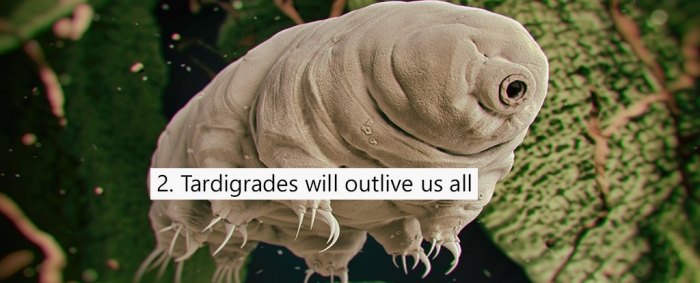So here, in no particular order, we've gathered some awesome science stories from this year that we thought were cool, special, or maybe just deserve more attention.
1. Sure, you heard of the neutron star crash, but what about these black holes?
In June, a large team of hard-working astronomers finally observed something that had been in the works for more than two decades - a pair of orbiting supermassive holes roughly 750 million light years from Earth.
It's a theoretical event that should happen after the merging of two galaxies, but until this year, nobody had evidence of it actually happening. And now we do.
2. Tardigrades will outlive us all, fact
The chubby yet bizarre water bear (Milnesium tardigradum) is probably the closest our planet has to a creature with actual freaking superpowers.
We already knew that tardigrades are seemingly indestructible, seeing how they can survive being desiccated, extreme heat, extreme cold, and even the vacuum of space.
And a study published this year established that, based on their incredible durability, tardigrades could survive nearly any apocalypse hurled at us from space, whether a gamma ray burst or a species-wiping asteroid impact.
3. Speaking of life on Earth, it might have come from meteorites
A study spanning research from astrophysics to chemistry and geology has given more weight to the hypothesis that the very first ingredients for life on our once-dead planet travelled here through space.
The team says that as space rocks splashed into warm, slushy ponds on the surface of young Earth, molecules arranged in just the right way to produce RNA polymers. We have to say, it's a pretty compelling model.
4. By the way, it snows on Mars
It might be the only planet fully inhabited by robots, but there's still a whole lot we don't know about the Red Planet. Of course, it's the subject of intense research and also the goal of a future space mission, so we should be paying attention.
In August, planetary scientists revealed something bizarre about Mars's weather patterns - turns out that during the night, there are severely intense snowstorms happening on the planet, basically pelting it with tiny chunks of ice and covering it in frost.
Given how little water there is, we sure didn't expect that.
5. 100-year-old drug showed incredible results as an autism treatment
For the first time ever, a medication that's normally used for treating sleeping sickness was tried in a pilot study on a group of boys with autism spectrum disorder (ASD).
The results were absolutely astonishing - after just a single dose, their ASD symptoms significantly improved. It's the best evidence we have yet for the 'cell danger hypothesis' of autism, which is a totally different way of looking at the disorder.
6. We also got an awesome diabetes breakthrough
In April, researchers announced they'd found a brand new type of insulin-producing cell that's been hiding in plain sight, right within the pancreas.
These 'virgin beta cells' have opened up new avenues for scientists who are trying to understand type 1 diabetes, and are working to come up with new, better treatments.
7. Physicists cracked the super-obscure Prince Rupert's Drop mystery
Prince Rupert's Drops are these baffling droplets that can be made by dripping molten glass into water.
The resulting tear-shaped baubles are incredibly strong on the thick end - you can smack them with a hammer or shoot with a gun, and they won't break. But all you have to do is snap the tail of the droplet, and suddenly the whole thing bursts apart.
For around 400 years, researchers have been trying to figure out why that happens. And now we finally know - what a time to be alive!
More about: #Science
















































